
(We continue a week-long rollout of a 2019 Top 50 list by NCS scribe DGR, counting down in groups of 10 each day. In this third installment we’ve got Nos. 30 through 21.)
Absent for a little while in this collective, what passes for black metal in my realm makes a return in part three of this year-end adventure. I think that I actually bookended this collection with that very thing this time around, because now is when rankings actually start to crystalize a little bit.
It still applies here, but usually when I do these it isn’t until I hit the final fifteen or so that you actually have a meaningful empirical ranking of shit that I’ve enjoyed this year. Everything else tends to be in flux, with some movements more drastic than others. Like the creation of a planetary system, all of these albums acrete around a solid gravitational pull, but the materials knock into each other all the time and either force each other into new orbits or they merge into new beings. Thus, when you reach thirty or so is when you really start coming across the albums that got a shit-ton of play from me this year.
Some were very late-in-the-year entries and others were so constant that they were the subject of the ‘oh shit did that actually come out this year or has it always been with me‘ existential panic that happens every year with this list. At the very least I haven’t revealed any of the 2020 promos we’ve gotten yet, so I’m going to take my small victories where I can get them.
There’s some fun ones in this collection next to the moodier black metal kids, and I think this one also has the start of a small subset of bands that I think contributed to the feeling that heavy metal lost its goddamned mind in 2019. Or it’s always been in the midst of a manic episode and this is the first year when I really noticed.
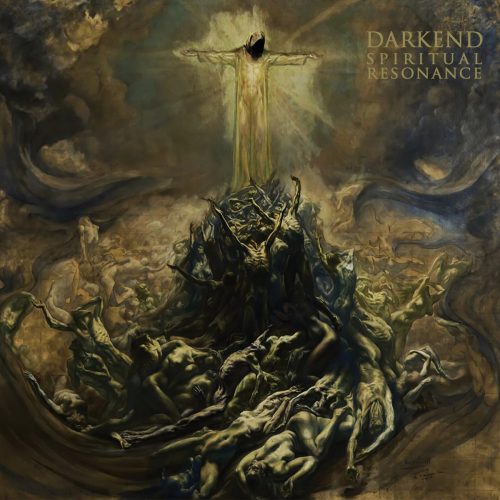
30) Darkend: Spiritual Resonance
Darkend’s brand of theatrical black metal has held sway around the NCS headquarters for a little while now and this year’s release of Spiritual Resonance continued that trend. The group’s shortest album to date, clocking in at about forty minutes, Spiritual Resonance contains only six songs, meaning that each track becomes a little mini-epic in its own right. The track lengths vary between five to eight minutes too, and for the most part keep the infernal hellfire generators set to ‘high’ throughout, really only slowing down to a mid-tempo stomp for two songs near the front.
In those two is contained the only guest appearance on the disc as well; whereas Spirtiual Resonance‘s predecessor included a decent-sized cast from outside of the band, this one slims things down a bit and keeps the focus on the group for the most part. My review for the site did a pretty deep dive on this one, going almost track by track, which is a whole lot easier to do with only six songs present. I found since its release that I tend to enjoy Darkend at their most vicious, so when vocalist Animæ is snarling over a decent wall of blasts and the band are firing on all cylinders behind him is when they’re at their best.
The pacing of Spiritual Resonance wound up coming off a little strange, as it starts with a massive song before settling into a stomp for a bit, although the vocal interplay on “With Everburning Sulphur Unconsumed” remains a huge highlight, and then going back into the massive symphonic black metal to close the affair out. There’s still something of a process of discovery going on here as well, as each adventure back into Spiritual Resonance has been fun. Those re-visits have also been part of deeper excavations into the group’s discography as a whole. It’s interesting to hear how much of a progression Spiritual… is from its immediate sibling, Canticle Of Shadows. It’s slimmed-down and a little meaner, still about as theatrical as before but with a lot more targeted ambition.
Darkend still feel like they’re writing black metal songs meant to be accompanied by a huge visual component. Just imagining those things playing out as their orchestration builds up in each song is part of the fun of listening to them. While the band are four albums deep into their career now, it’s exciting to think about just where Darkend may take things next.
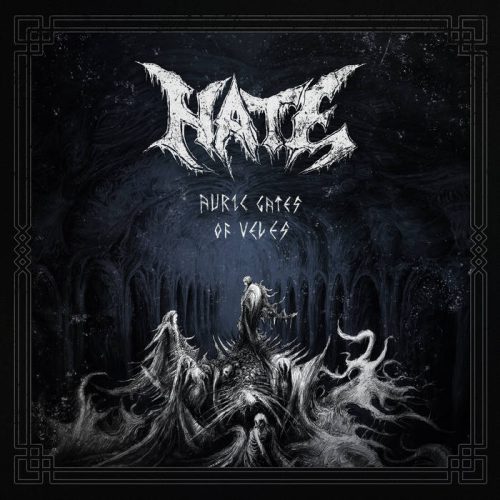
29) Hate: Auric Gates Of Veles
I was initally surprised by how short Hate’s album Auric Gates Of Veles was. It’s a very compact half-hour from a band who seemed intent on expanding their sound in an atmospheric direction, to augment the sort of hammering and non-stop style of blackened death metal they play.
The latest in an expansive collection of albums iterating on the same sound, Auric Gates Of Veles is definitely a Hate album for better or worse. For much the same reason I listen to Rotting Christ (as explained in a previous segment of this list), I will listen to Hate. I know exactly what I’m in for, and while some shine far brighter than others, the group has a consistently good track record, and so throwing on their discography can often just be a case of letting it run and letting Adam bellow at me for hours on end.
Despite the generally familiar feeling to Auric Gates Of Veles there are still some pleasant surprises within its gates, so to speak. The mid-section of the album is surprisingly sleek and fairly black-metal sounding, like the band felt they had gotten too far into the death metal realm and wanted to really lean on the anti-religion side of the sphere. So there’s a solid block of songs starting on “Sovereign Sanctity” until “Salve Ignis” where you can actually hear the black metal influences really start to worm their way back into the group’s sound. The opening section of “Salve Ignis” is about as hellfire and brimstone as Hate have gotten in some time, on an album in which hellfire and brimstone are practically the bread and butter by which the band get by.
As silly as this is about to sound, Auric Gates Of Veles was another one of my default go-to albums. The atmospherics that became part of Hate’s sound during Solarflesh and were somewhat ramped up on Tremendum remain here, but this is when they’re not leaning into the blackened part of their genre descriptor, and Auric Gates Of Veles is about as Hate an album as Hate have ever written. That said, the fact that it absolutely breezes by once you’ve dropped the two pre-pro demos — as interesting as it is to hear songs prior to the big studio treatment — really did help it a ton in just becoming a constant and fast fiery blast for me to jam out to this year.
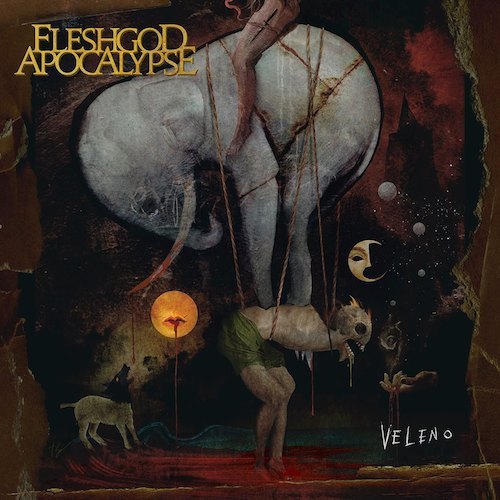
28) Fleshgod Apocalypse: Veleno
I reviewed Veleno for this very site right around the time of its release. Fleshgod Apocalypse‘s brand of operatic bombast holds huge appeal for me as a symphony dork, so Veleno was always destined to stick around from the moment of release.
It is an interesting album for a couple of reasons: It’s the first since the group’s big lineup shift, recruiting a new guitarist and drummer into the fray while longtime drummer Francesco Paoli stepped fully into a vocal and guitar role, and it’s also an album that follows up the release of probably what is still their most massive-sounding album to date in King. Veleno finds itself spread a little thin, partially playing it a little safe but also trying so many different things that it doesn’t quite congeal together as easily as their early albums do. It feels like a smattering of really good Fleshgod songs that at times tie together but at other times seem to come out of left-field.
For instance, Veleno basically starts with no intro or build-up with “Fury”, so that from moment one the album is already in high gear, which is different from the pacing of the last few discs. Yet “Sugar” is in the traditional third slot of the album, which seems to be reserved for the classic ‘near-relentless assault of a song’ that the band are masters at writing. “The Praying Mantis’ Strategy” at times feels out of place mostly because it’s just a build-up to “Monnalisa”, the slower and bass-guitar-heavy affair of a song that is something of an alternate universe “Cold As Perfection” in terms of pacing
Then the band follow that up with the three-pack of “Worship And Forget”, “Absinthe”, and “Pissing On The Score”, all faster songs that are some of the more interesting in Veleno’s track listing. They each have their own little quirk: “Worship and Forget” is one of the fastest songs on Veleno and matches “Sugar” in intensity; “Absinthe” is mostly clean-sung and driven by bassist Paolo Rossi; and “Pissing On The Score” is easily one of the catchiest songs Fleshgod Apocalypse will have in their collective for a long time.
But also because of this, Veleno has the sense of being all over the place song-wise, and to add to it, Veleno has the group reigning it in a bit. Thus, it’s less of a spectacle than Fleshgod Apocalypse have written previously, so those who come to the band solely for the large amount of bombast they dish out might be surprised. I still found Veleno to be enjoyable and still go back to it constantly — mostly for the front two-thirds of the album — so it easily makes into my year-end collection.
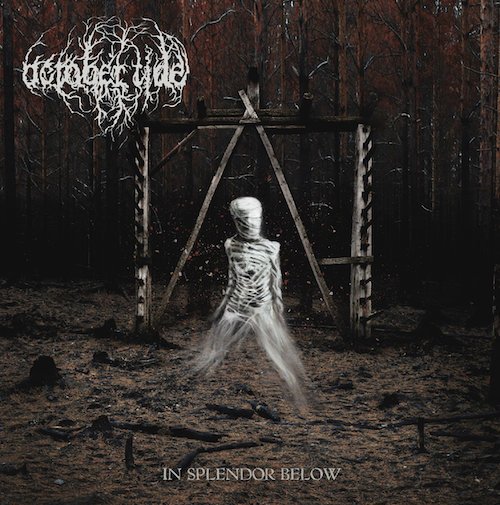
27) October Tide: In Splendor Below
October Tide’s In Splendor Below was an unexpected shift in sound for the group. The miserable doom metal band made their name with crawling-through-the-muck, slow-moving funeral doom, and so hearing the band letting a bit of death metal influence back into the fray made the album a far more interesting experience from the word ‘go’.
“I, The Polluter” makes that mission pretty clear as it starts off at a much higher tempo than the band have been at for a while now, showing that In Splendor Below is going to be a much different experience than the three albums the band have done since their return in 2010. There’s still plenty of misery to be found here, but the album’s opening few songs lay the groundwork for a disc that is going to do much more than slowly pull itself along with what little strength it has left. “Ögonblick av nåd” is another early song that keeps things at high speed in October Tide terms before the group dive deeply back into the world of doom on “Stars Starve Me” — the first of the longer songs on In Splendor Below.
The album paces itself, so that the larger and slower songs are in its back half. So if you’re in the hunt for a more traditional October Tide experience, you may want to start at “Our Famine” and let it run, so that you loop back around to the beginning later.
In Splendor Below was a May 2019 release, yet it still held on throughout the year. Part of that enduring appeal derived from the aforementioned surprise at how much quicker things seemed to move in the first half of it, and the other part is that October Tide are still incredibly good at making misery and melancholy seem absolutely gorgeous. Though things have been grimed-up to match the band’s pile of roots and sticks, death-metaled-up logo, October Tide get a ton of mileage out of vocalist Alexander Högbom‘s howls of despair — especially during the previously mentioned “Our Famine” — and are plenty happy to add to that atmosphere of muck.
This was another one I had a blast reviewing, so if you need more of me yelling at you about how good it is before you hit play, feel free to jump through there.
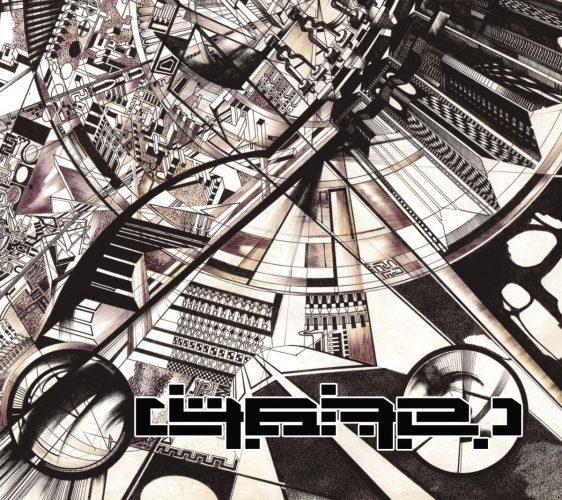
26) [4672]: [Aether]
[4672]’s 2019 release [Aether] might be one of the first releases this year where I got the sense that heavy metal was having an existential crisis. Clued into them by a roundup on our site that actually had a really good lineup of bands, looking back at it, the almost random listing of band references that accompanied the description of [4672] meant I had to check it out. If anything, it seemed guaranteed that the music might just be a complete fucking mess — which I am often completely okay with.
First off: Every song on [Aether] is written within brackets, much like the group’s name. I will be dispensing with that… now… for the sake of my sanity. Second: What makes Aether interesting is also the fact that nearly every song on here is sub-three minutes, and the few that go over barely make it. The one that does make it is “Modus_Operandi”, which might as well be a doom song in comparison to most of the industrial grinders on Aether; it goes for nearly four minutes.
Much as the near-random listing of comparisons that appeared in our roundup suggested, [4672]‘s M.O is to throw everything at the wall, and whether it sticks or not, to have at least five backup plans to play with along the way. Songs dart and shudder about, some may be built around one real-specific and hammering groove, others start and stop whenever it seems like someone got distracted, and some feel like they’re written just to be an assault of noise.
As a whole experience Aether can be wild and wooly. It’s often one of the more fun aspects of heavy metal to have a band pick you up and throw you around like a rag doll, and much of the way Aether is written seems built to do just that. It’s hard to pick out specific songs when the whole thing feels like a neatly contained ball of chaos. This is one of those where you have to start it and let it run. I found the manic framework that [4672] work with to be an exciting change of pace from my usual death metal bludgeonings, and my industrial dork side was drawn to the band’s electronic playthings constantly weaving throughout each song.
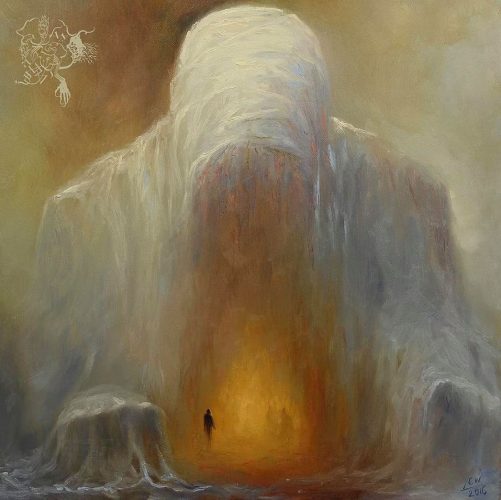
25) Abigail Williams: Walk Beyond The Dark
Abigail Williams‘ album was one of the latest-in-the-year releases in this archive. While I’ve generally enjoyed the band’s previous releases, Walk Beyond The Dark caught me off-guard with how good it was — like every idea had finally aligned just right to make for an excellent seven-song release of misery.
I’d be curious to know which song it was where people found out they were really locking into the disc — and I would love to know just how many of them were wrong, because it is clearly the part that starts about three minutes and twenty seconds into “Sun And Moon”. There, the song shifts from being this crushingly heavy black metal song to a moodier bass-guitar-dominated piece with Ken screaming ‘shedding my skin’ over and over on top of it. That whole minute or so is such a surprising turn after the initial wave of music, which is an eight-minute black metal showpiece in the opener “I Will Depart” and then an intense three minutes leading up to it in the first half of “Sun And Moon”.
It’s the one part that really colored Walk Beyond The Dark for me, although the disc turned out to have clearly excellent songs throughout. It was also interesting to see how each track would be bent and mutated throughout the runtime. Songs vary wildly, from eight minutes to four in the opening group, and ranging to the last two being nine- and ten-minute epics. You need to take in the album as a whole, hearing how each song flows into the next one, and then hearing how each track organically mutates into its own specific monster.
There’s a handful of real highlight moments throughout the adventure of Walk Beyond The Dark — hence why I previously mentioned that I’d be curious to see where folks really settled into the album, because damn, it’s one of those releases where you hear one part and then you can’t stop thinking about it for a long time. I’ve purposefully avoided listening to it while trying to write this little bit here, but I may be dooming myself to another spin or two of it in the aftermath.
Also, that album art is gorgeous.
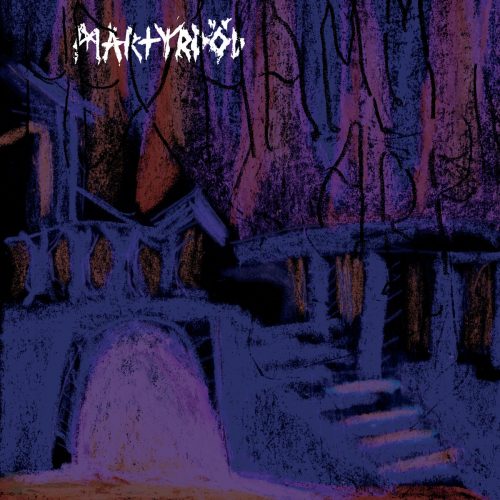
24) Martyrdöd: Hexhammeren
There are some on this site who would lead you to believe that they were disappointed by Hexhammeren. There are also people on this website who hate fun, and people who don’t get down with this disc are chief among them.
Yes, it’s true that Hexhammeren features three times the amount of drumbeats than what List has (a whole three in total! vs. List’s one), and because of that there are different tempos throughout Hexhammeren, so it’s not just an endless d-beat for a half hour plus. It’s also really funny that Martyrdöd are amongst the crew this year who wrote a song (in the form of “Cashless Society”) and then went ‘oops, we actually made it a little more death metal than expected’, but that song fits in so well in its tracklist placing that I can’t imagine it doing anything other than following “Nästa Syrien”, especially given that “Nästa Syrien” is an easy album highlight.
Martyrdöd do still find plenty of time for their classic sound throughout Hexhammeren, but as a whole the disc is a little more dynamic than before. The fact that they were even willing to be experimental with their songs this time around made it an interesting listen. Not every song hits, but Martyrdöd find a pretty even-keeled groove throughout the album, so it’s a lot of fun listening to them switch up from the d-beat-fueled tracks to the more melodeath driven ones, to the couple of songs that just stomp around like heavy monsters. Even the bonus “After War Scars” is interesting, in part because it’s one of the few times where the bassist gets the spotlight.
I can see why people might’ve been let down by Martyrdöd’s latest but I was not among them at all. Instead it just slotted in rather nicely to an already pretty expansive discography, and the change of pace every once in a while was welcome, so that it didn’t quite lose steam or feel like an album of just pure ‘mood’.
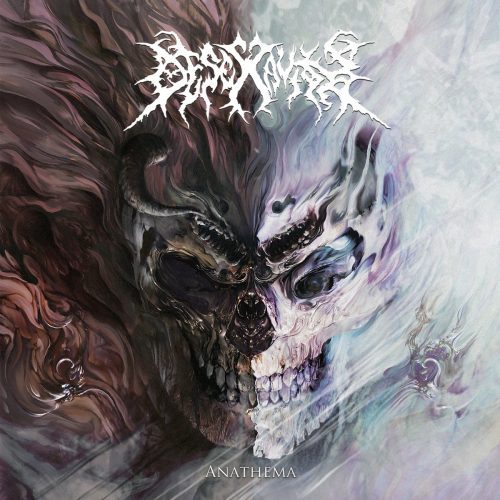
23) Desecravity: Anathema
Okay, so I can’t help myself when it comes to this one. I’m partially convinced that it’s because I’m enamored of drummer Yuichi Kudo‘s drumkit (seriously! look at this fucking thing!), but Desecravity’s brand of everything-and-the-kitchen-sink death metal has the group straddling the tech-death and brutal death divide pretty hard. Anathema is only a half hour long but goddamn if it doesn’t feel like you’ve been put through the wringer by the end of it. Desecravity pack so much within each song that it’s more maelstrom than it is music after a while.
How the band have enough room in their heads to keep track of half of the changes within a song is beyond me, much less a setlist’s worth, since the group are three albums deep now. Since the band are focused on such endless brutality, a release like Anathema can slide in perfectly alongside groups like Dying Fetus, especially since Desecravity have developed a similar knack for shifting from blindingly technical to boulder-stupid in a half-second of riff writing as well, though there’s a handful of songs on Anathema where things don’t stick around long enough to even last a whole verse.
This is probably why Desecravity draw a lot of comparisons to Wormed as well, with the group making for an excellent meeting point between brutal and tech. The constant switching of “Impure Confrontation” (linked above) makes for an excellent preview of Anathema as a whole. It has something of a twin in the back half of Anathema, as “Bloodthirsty Brutes” has a similar tapped-out guitar whirlwind of an opening before vocalist Yujiro Suzuki screams himself hoarse over the course of the track.
Anathema is the sort of album where you’ll know whether or not you can hang with it after the first two or so minutes. That includes the somewhat out of place orchestral intro, but after that you’ll have about a minute of kinetically charged death metal to try and figure out if you want to stay. I hung with this album constantly because of just how much there is to it. It released in January and I still have a lot of fun noticing different things in between sessions of being completely overwhelmed by it
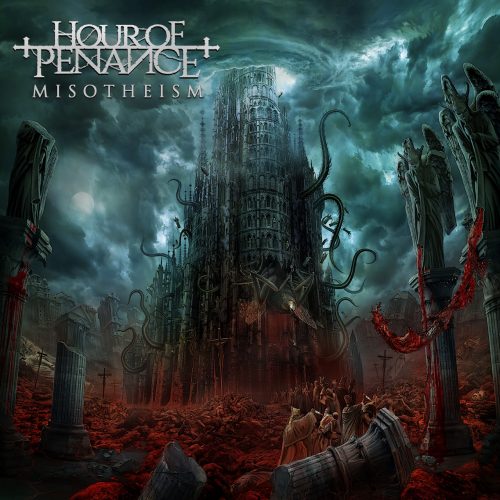
22) Hour Of Penance: Misotheism
It’s a weird situation with Hour Of Penance this year. Every band even tangentially connected to their wide family tree put out an album this year, and who would’ve foreseen that the group just doing the humble act and writing their usual anti-Christianity screed would’ve placed them so high? For a while it seemed like Hour Of Penance were on an every-other-album cycle with me, where I genuinely enjoyed everything on offer, yet the ones that really stuck would be every other release. Misotheism might be the change in that pattern, as it’s been sticking with me just as much as its predecessor Cast The First Stone did.
Andy handled the review for this one and came to much of the same conclusion I did, which is that Hour Of Penance very much have an ‘if it ain’t broke, don’t fix it’ writing style. Every album is an iteration upon a core sound, so it’s hard to pin down why a certain disc may stick with you. I, strangely enough, found Cast The First Stone to be kind of catchy at times but Misotheism charts a different course, adding a grim atmosphere to the band’s skull-shattering death metal.
Hour Of Penance played with this a bit on Cast The First Stone, working in some very light backing symphonics on a few songs and they continue doing this on Misotheism — most notably in its opener “Mass Crucifixion Of Kings”, which is the scene-building intro song, and a little of that carries over into “Blight And Conquer”. What happens for the next close to forty minutes is the standard Hour Of Penance bludgeoning the listener into the ground album experience, but I’d be damned if I didn’t say I still found myself enjoying this one a ton.
It’s an unassuming sort of disc — which is hilarious to say when regarding this sort of EVERYTHING AT MAX VOLUME style of death metal — yet when their brethren are often finding different ways to put new spins on things, Hour Of Penance just augment what they’ve always done, and when it works, it works so damned well. The only reason this one found itself in the ’20s or so on this list is because I’m already pretty used to what they do, so I know what I’m in for a la the previously ranked Hate and Rotting Christ,
This album found itself part of a massive avalanche of metal in the back-half of 2019, and this year was also so surprisingly good that even putting it here in this position, I have the sense that a lot of people’s lists are going to wildly different this time, save for a small few.
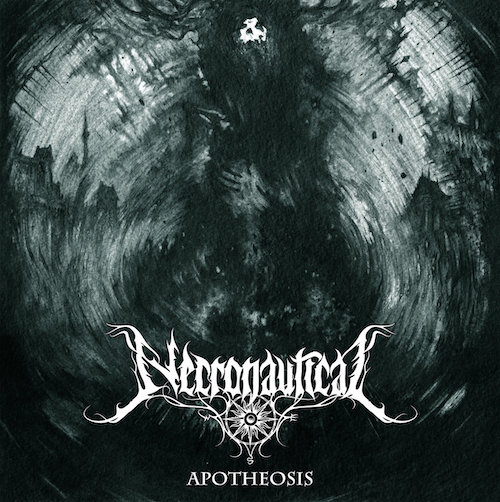
21) Necronautical: Apotheosis
I really, really, really liked Necronautical’s last album The Endurance At Night, so their first Candlelight Records release Apotheosis had a very tall order to fill. Which in hindsight is a whole lot of fun to think about, because it’s now clear that Necronautical basically looked at the idea of trying to follow up The Endurance At Night and went, “Pass, we’ll do something different instead”.
The symphonic black metal that characterizes the band is still at the core of Necronautical’s tail-end-of-September release, but the group have moved deeper in an atmospheric and epic black metal direction. Every one of the seven songs present here is between six and eight minutes in length, so Necronautical are making sure you get a lot of music. Sometimes, they lean heavily on the horror movie synths, and at other times the band dial all of the non-core instrumental pyrotechnics all the way back.
Each song on Apotheosis becomes its own little story in that sense, so you have the cymbal-catching start/stop of a song like “All Is Vanity” — which I deeply love for its chorus — as well as the horror-movie-drenched atmosphere of “Nihil Sub Sole Novum”. Within the first two songs alone, Necronautical make the case for two completely different styles. and they do so again and again throughout Apotheosis — so that part of the listening experience is the adventure of that.
It’s an expansive album, the sort of disc that you need to gird yourself for when you decide to spin it. But it came damned close to breaking into the top twenty for me this year. Its late September release meant it was something that I was exclusively listening to for a bit, and I think my review and general dissection of it back then highlights that. It was even one of the first where I had to kick the rust off ye olde writing skills after disappearing from the site for a few months. If you haven’t given these guys a chance yet, I highly urge you to do so. Apotheosis is just as good a place to start as any of their others.
Although The Endurance At Night is pretty fucking good too.

“There are some on this site who would lead you to believe that they were disappointed by Hexhammeren. There are also people on this website who hate fun…”
I feel personally attacked by this.
I believe it is what the kids refer to as ‘being seen’
Is that… is that good?
I don’t know, you’re the one that handles the Twitter account.
[4672] – [Aether] rules! Awesome stuff!
Interestingly… just now I’m listening Desecravity.:)